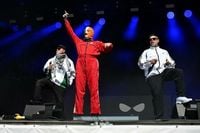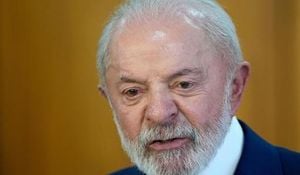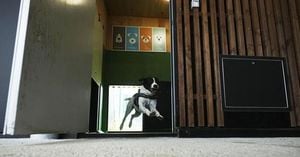In a move that has sparked heated debate across continents, Canada announced this week that it would bar entry to the Irish-language rap group Kneecap, citing the band’s alleged public support for terrorist organizations and accusations of hate speech. The decision, made public on September 19, 2025, by Parliamentary Secretary for Combating Crime Vince Gasparro, has been met with both strong support from Jewish advocacy groups and fierce opposition from the band and its supporters.
Kneecap, a trio formed in Northern Ireland in 2017 and known for their energetic blend of hip hop and Irish-language activism, had been scheduled to launch a Canadian tour with performances in Toronto and Vancouver starting October 14. But those plans evaporated overnight as Gasparro delivered a video statement on social media, declaring, “The group have amplified political violence and publicly displayed support for terrorist organizations such as Hezbollah and Hamas. They are dangerous endorsements of violence and hate.” According to Gasparro, “Political debate and free speech are vital to our democracy, but open endorsements of terrorist groups are not free speech.”
The Canadian government’s action follows similar moves by other countries. Hungary banned Kneecap earlier this year, and France reportedly took comparable steps not long before Canada’s announcement. The group has become a lightning rod for controversy in the music business, with performances canceled and entry denied in multiple nations due to their outspoken pro-Palestinian stance and criticism of Israel’s actions in Gaza.
The controversy surrounding Kneecap intensified after an incident at a London concert in November 2024, where band member Liam Óg Ó hAnnaidh (who also performs as Mo Chara) was accused of brandishing a banned Hezbollah flag and chanting slogans in support of both Hamas and Hezbollah. UK authorities charged Ó hAnnaidh with a terrorism-related offense for the flag display, and his next court hearing is scheduled for September 26, 2025. The case has already disrupted Kneecap’s international touring schedule, leading to the cancellation of 15 U.S. dates and casting a shadow over their future appearances abroad.
Despite the charges, Kneecap remains defiant. In a series of statements posted on social media, the group called Gasparro’s accusations “wholly untrue and deeply malicious,” insisting that none of its members have been convicted of any crime. “We will be relentless in defending ourselves against baseless accusations to silence our opposition to a genocide being committed by Israel,” the band stated. Kneecap further announced legal action against Gasparro, vowing, “When we beat you in court, which we will, we will donate every cent to assist some of the thousands of child amputees in Gaza.”
The band’s legal team has already initiated proceedings, and Kneecap has made it clear that any compensation awarded would be directed to children injured in the ongoing conflict in Gaza. “We will defend ourselves to the end against these allegations aimed at suppressing our voice opposing the genocide in Gaza,” the group posted on Instagram. This combative posture has only heightened the attention around the case, drawing in supporters and detractors from around the globe.
Kneecap’s activism is hardly new. The group has long used its platform to highlight Palestinian rights, often leading crowds in chants of “Free Palestine” and displaying banners supporting the cause. Their appearance at England’s Glastonbury Festival in June 2025, where they unfurled “Free Palestine” banners and expressed solidarity with the activist group Palestine Action, drew a sharp rebuke from the Israeli embassy in London, which labeled their actions as hate speech. The ripple effects were felt elsewhere: Washington canceled visas for members of another British act, Pop Villain, following similar pro-Palestinian chants at the festival.
The Canadian ban has been welcomed by several Jewish advocacy organizations. The Centre for Israel and Jewish Affairs (CIJA) said the decision was a necessary stand against “incitement, hate and radicalization,” while B’nai Brith Canada described the move as a “victory.” Nicole Amiel, a spokesperson for CIJA, told CNN that the group had been “very vocal about them not being allowed to come into Canada.” According to the Canadian Department of Immigration, Refugees and Citizenship, entry to Canada can be refused for reasons including security concerns, human or international rights violations, or criminal activity—though officials declined to comment specifically on Kneecap’s case out of privacy concerns.
Still, the ban has ignited a debate about freedom of expression and the boundaries of artistic activism. Howard Sapers, executive director of the Canadian Civil Liberties Association, told CNN that he could not recall a previous instance of Canada banning a musical group from entering the country. “The way that this decision was made public seems overtly political,” Sapers argued. “And for me, it’s a real problem when a government is signaling that it’s either willing to politicize what’s really an administrative process or even worse, it’ll use an administrative process as a lever when pulling the legal lever is just too hard. In this case, there’s a much higher threshold to define hate speech than what the immigration officer needs to deny entry.”
Gasparro, for his part, has maintained that the ban is consistent with Canadian law and values. “Our government will not tolerate the advocating of political violence, terrorism or Anti-Semitism and hate more broadly,” he wrote. “Freedom of expression is a fundamental right, but public support for terrorist organizations does not fall within it.”
The band’s supporters argue that Kneecap’s exclusion is less about public safety and more about silencing dissent against Israeli military actions in Gaza. Since October 7, 2023, Israeli operations in the Gaza Strip have resulted in the deaths of more than 65,000 Palestinian civilians, most of them children and women, with over 166,000 injured, according to preliminary figures cited by Quds Press. Thousands remain trapped under rubble, with rescue and medical teams unable to reach them. Kneecap has repeatedly condemned these actions, accusing Israel—and by extension, its Western allies—of committing genocide, a charge that has fueled both their popularity and the backlash against them.
The group’s activism has not come without cost. In April 2025, Kneecap performed at the Coachella Valley Music and Arts Festival in California, where they again accused Israel and the U.S. government of genocide against Palestinians. The appearance prompted calls for their U.S. visas to be revoked and led to the cancellation of several shows. Similar controversies have followed them across Europe, with Hungary’s government accusing the band of “normalizing hate and terror”—an allegation Kneecap has categorically denied, stating, “We stand against all hate crimes.”
As the legal battle between Kneecap and the Canadian government unfolds, the case has become emblematic of broader tensions over free speech, artistic expression, and the limits of political activism in an era of rising global polarization. Whether the courts ultimately side with the band or the government, the outcome will likely reverberate far beyond the world of music, shaping debates about dissent, security, and the boundaries of acceptable discourse in liberal democracies.
For now, Kneecap’s Canadian fans will have to wait—and watch—as the group’s fight for entry moves from the stage to the courtroom, with the world looking on.





